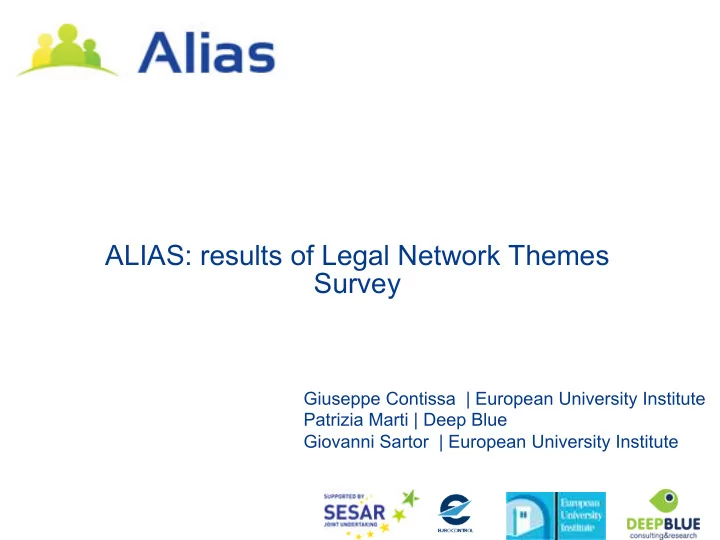

ALIAS: results of Legal Network Themes Survey Giuseppe Contissa | European University Institute Patrizia Marti | Deep Blue Giovanni Sartor | European University Institute
First set of issues • Is a State responsible when ANS is delegated to a private provider? And to another State? • Is always the operator (the last link) responsible? • Who is responsible for bad maintenance of technology? • When is a technology faulty?
Überlingen mid-air collision(1996)
Überlingen • The separation infringement between Flight 2937 and Flight 611 was noticed by ATCO only less than a minute before the accident. • The controller contacted Flight 2937, instructing the pilot to descend by a thousand feet to avoid collision with Flight 611. • Seconds after the crew of Flight 2937 initiated the descent, their TCAS instructed them to climb. The crew disregarded TCAS instructions and continued to descend as instructed again by controller. • At about the same time the TCAS on Flight 611 instructed the pilots to descend. • Both aircraft descended and finally collided.
State responsibility in Überlingen collision • Issue: is a State responsible when ANS is delegated to a private provider? And to another State? • Answer: the Federal Republic of Germany was considered responsible for the accident being in charge of air traffic control on its territory, and having failed to delegate such task to Swiss authorities.
Liability for (Cross-Border) Air Navigation Services • Art. 28 Chicago convention: each State is responsible for providing ANS in its territory. • Most States complies establishing a national air navigation service provider (ANSP) • In absence of a global or regional convention on the liability of ANS, issues of liability are governed by the national laws of the State over the territory of which the services are provided. • State primary responsibility doctrine • State ultimate responsibility doctrine • Service provider’s exclusive liability doctrine
Organizational responsibility, responsibility of operators • Issue: Is always the operator (the last link) responsible? • Answer: • 3 Skyguide ATC managers were found guilty of multiple manslaughter by a Swiss Court and sentenced to 1 year of prison • ATCO + ATC supervisor were acquitted
Responsibility for maintenance • Issue: Who is responsible for bad maintenance of technology? • Answer: • 1 ATSEP Project Leader was sentenced to a fine • The technician on duty at the night of the collision was acquitted.
Technological faults • Issue: when is a technology faulty? • Answer: no liability for technology producers/standard setters • After Überlingen, studies have been made to improve TCAS II capabilities. As a result, in 2008 a new standard has been adopted
Standards and liability of manufacturers • according to EU law, safety standards may constitute a reference for defectiveness. • Publicly approved standards: compliance does not exclude liability, while a violation generally implies liability • Private standards: compliance is voluntary, but it may facilitate proof of safety
Liability of standard-setters • The Italian Ministry of Health was held liable for the damages arising out of contaminated blood and blood products • The AABB was declared liable for failing to adopt a standard calling on blood banks to surrogate test blood donors.
Liability of standard-setters • Yes, they should be liable because … • this promotes innovation in standards • This prevents the adoption of weak standards to satisfy the economical interest of companies • Because companies, legally or de facto , are obliged to comply with the standard • No, because … • Standard setting bodies have superior knowledge in comparison to judges • They need to make innovative choices • They express reasonable opinions which companies may take or not • They may not have the financial resources to face liability • Remedies: • Insurance • Disclaimers
Some further issues • access to information, transparency and privacy • responsibilities and liabilities in mixed-mode environments • attribution of responsibilities of pilots and ATCo in aircraft auto- separation • use of legal case in SESAR projects for testing the case and/or the project • liability attribution in monitoring/supervision tasks • legal implications of UAS • insurance-based compensation systems for damages due to automation • May the threat of liability deter organizations from reporting troublesome events?
Legal implications of UAS • Do risks of UAS exceed potential benefits? • Can flying UAS be considered an abnormally dangerous activity? • Are owners/users of UAS strictly responsible for damages caused by such aircraft? • Air-to-air collisions vs ground damage
Insurance-based compensation systems • Should users insure themselves against damages from automation? • Risk due to technological failure are difficult to quantify • Insurance should not reduce incentive to take care and mitigate damages • Who should take insurance?
Liability reporting and safety culture • Should excusable mistakes be punished? • How should reporting be encouraged? • What incentives for favouring reportings from organizations? • Difficult issue: we will investigate how liability regimes may impact on safety culture at the levels of individuals and organizations
CONFERENCE ON LIABILITY AND AUTOMATION IN SOCIO-TECHNICAL SYSTEMS 14-15 June 2012, Villa Schifanoia, Fiesole, Florence (Italy)
14-15 June 2012 Florence, Italy Objectives : • officially launch the Network of legal research in ATM; • identify topics to be addressed in the Network; • involve research communities sharing similar issues; • address liability issues in automation and ATM, share results of the ALIAS project; • discuss further legal issues in STS, best practices, cases.
Questions? Thanks for your contribution Please join the ALIAS network to further develop these issues!
Recommend
More recommend